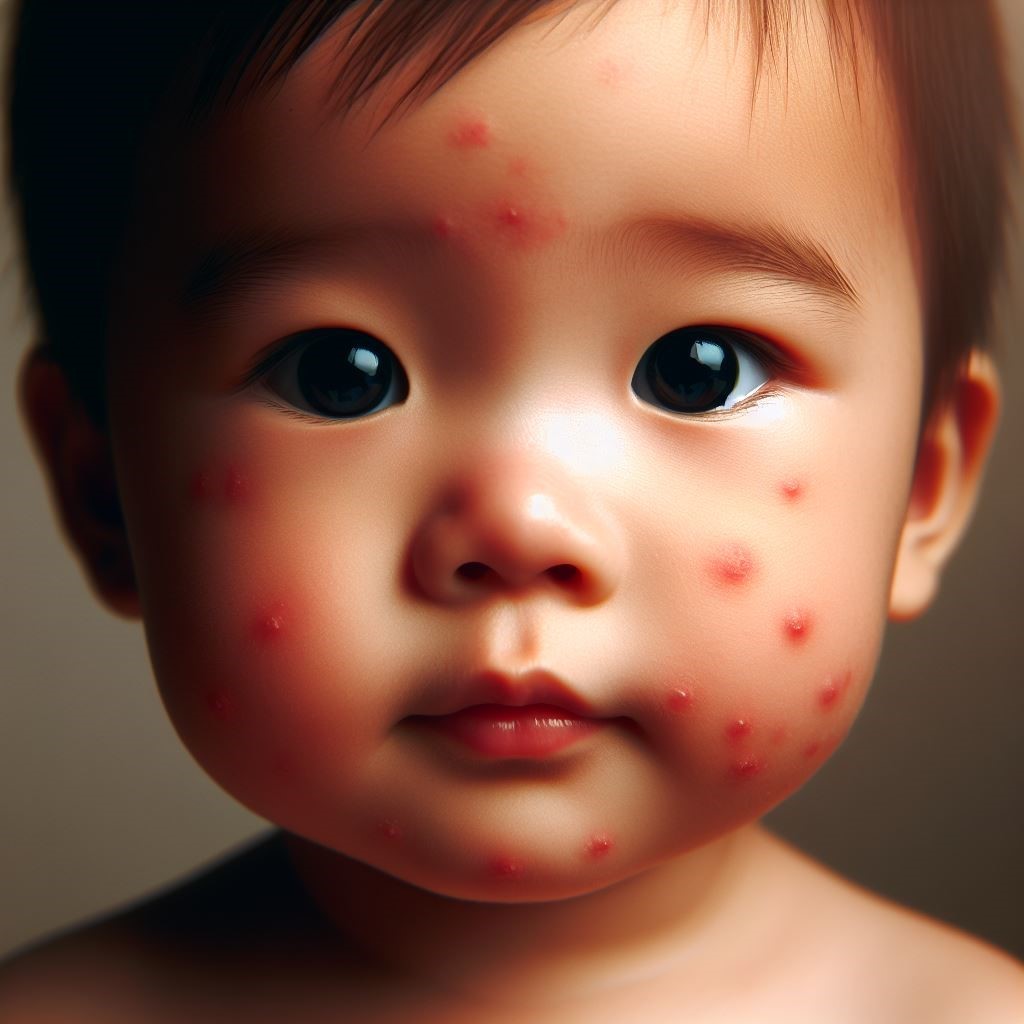Explore comprehensive baby acne treatment – uncover causes and effective solutions for your little one’s delicate skin. Nurture a healthy, radiant glow. Baby acne treatment guide.
Introduction
Many new parents are surprised to find red bumps and pimples popping up on their perfect newborn’s face. This common condition is known as baby acne, and it affects over 20% of infants. While disconcerting, Infant skin blemishes. It is harmless and often clears up on its own.
But there are also safe, effective remedies to help treat it. This article explains what causes and provides gentler infant skin blemishes. Treatment solutions give tips to alleviate flare-ups and prevent scarring. With a little TLC, your little one’s pimply skin irritation can be calmed.
Baby Acne Overview
Baby acne is a very common condition seen in newborns around 2-4 weeks old. It occurs when hormones from the mother overstimulate oil glands in a baby’s skin, leading to clogged pores and pimples. The bumps usually appear on the cheeks, nose, chin, forehead, and scalp. While it looks uncomfortable, Infant skin blemishes. It is harmless and goes away within a few months as hormones normalize. Gentle skin care can help clear it up faster and prevent scarring.
What is the location of symptoms of baby acne to appear?
The most common locations for baby acne breakouts include:
- Cheeks – The soft cheeks are frequently affected by scattered pimples.
- Nose – Pimples often develop along the sides and tip of the nose.
- Chin – The chin is another prime target for acne, especially along the jawline.
- Forehead – Bumps frequently occur along the hairline and forehead.
- Scalp – Acne may develop along the edges of the scalp near the hair follicles.
While the face is the predominant area, the neck, back, chest, and arms may also be affected in some cases. Note where symptoms first appear on your baby’s skin.
What Causes Baby Acne?
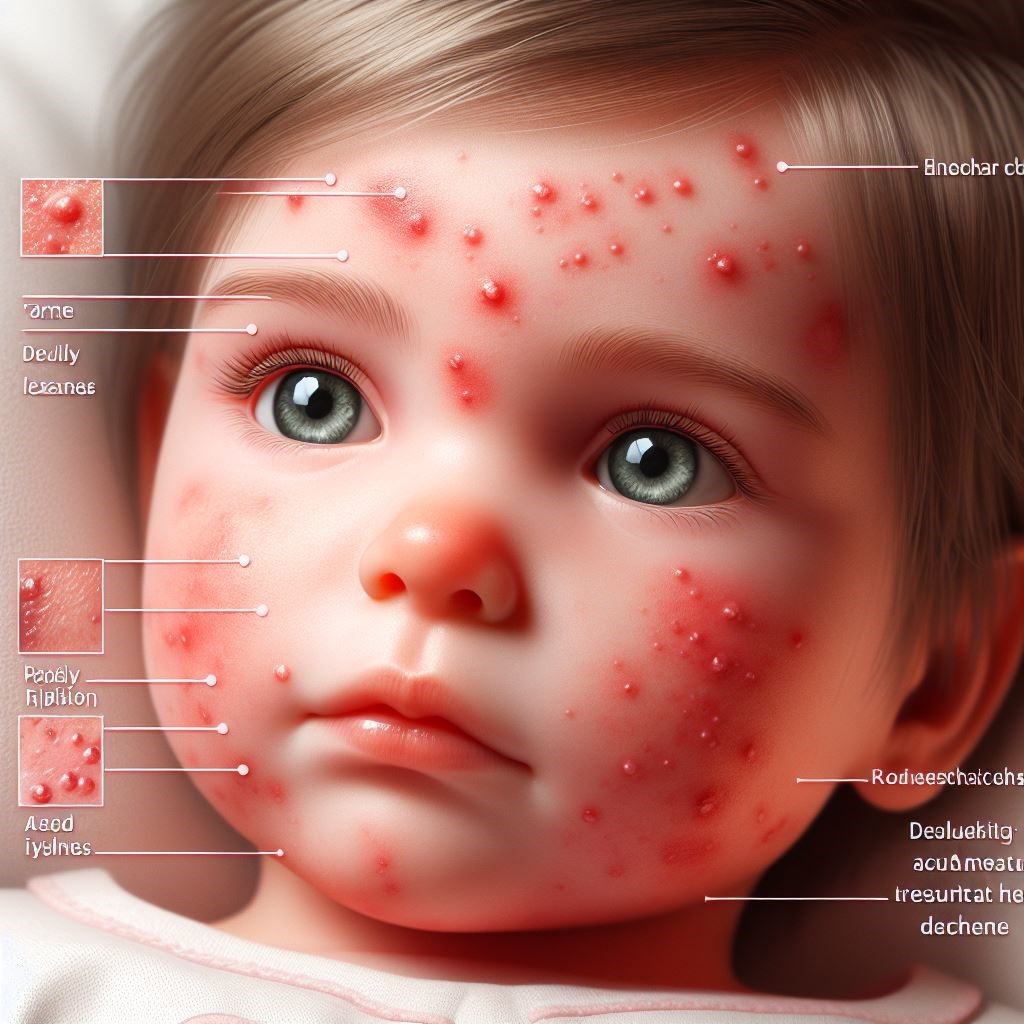
Before learning how to treat baby acne, it helps to understand what causes it. Baby acne is not true acne, like in adolescents and adults, but a rash resulting from leftover maternal hormones.
- Hormonal stimulation – Androgens from the mother overstimulate oil glands and pores.
- Immature skin – Babies have extra-sensitive skin that is more prone to inflammation.
- Bacteria – Acne bacteria on the skin (p. acnes) flourish in oil.
- Genetics – A family history of acne makes some babies more predisposed.
In newborns, these factors combine to clog pores and create red bumps on the cheeks, chin, forehead, and scalp. Baby acne usually appears around 2-4 weeks old and can last for several months before hormones normalize.
Baby Acne Treatment Options
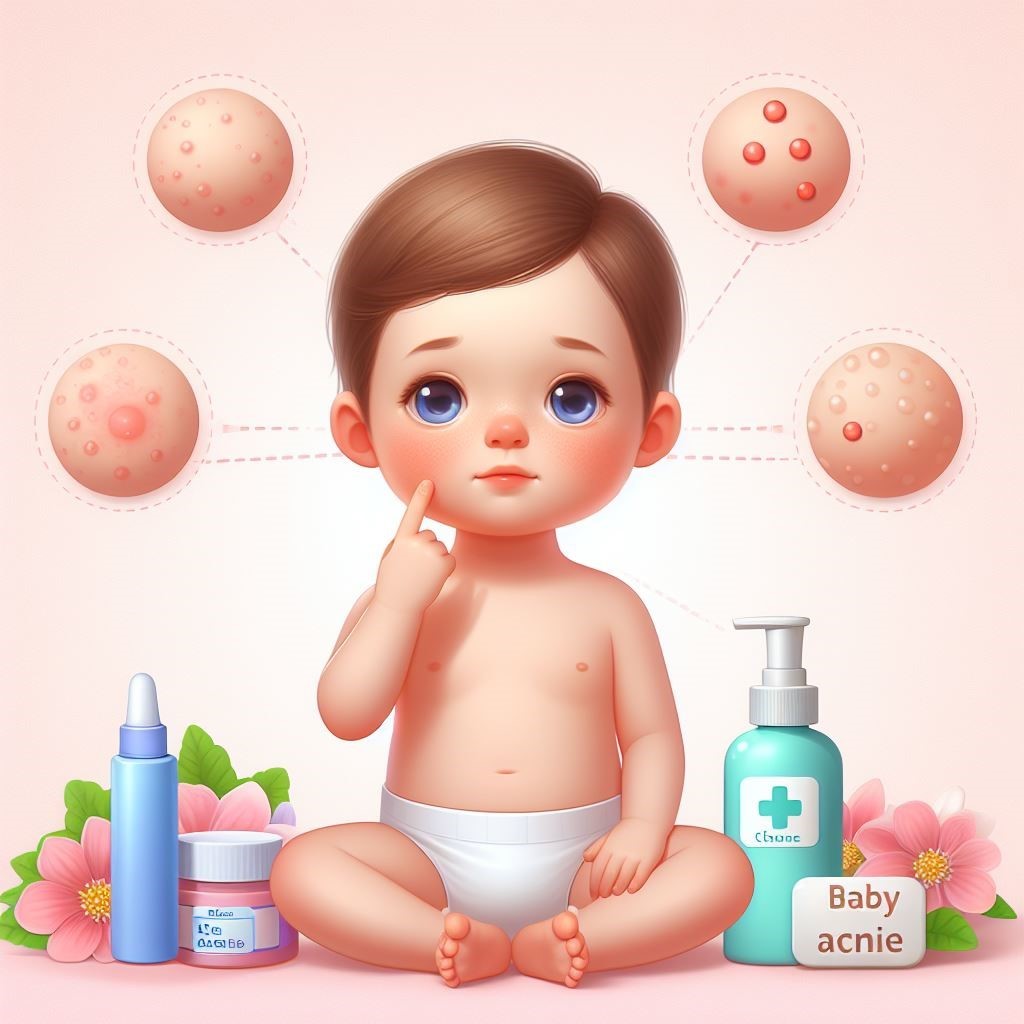
Treating baby acne requires gentle care for delicate infant skin. While most cases resolve on their own, these methods can help hasten healing and prevent scarring:
Cleanse Gently
- Wash your face once daily with lukewarm water and a mild, fragrance-free baby wash.
- Gently pat dry with a soft towel. Avoid rubbing.
- Never use adult acne products like benzoyl peroxide.
Moisturize
- Use a gentle, hydrating baby moisturizer suited for sensitive skin.
- Look for calming ingredients like oats, aloe vera, or chamomile.
- Apply after washing morning and night.
Treat Topically
- Ask your pediatrician about using a mild 1% hydrocortisone cream on inflamed spots.
- Breastmilk contains antibodies that can help fight Infant skin blemishes. too.
- Dab these solutions on the affected areas with a cotton ball 2-3 times daily.
Don’t Pick/Pop
- Never squeeze or pop a baby’s acne, as this can lead to infection.
- Keep your hands away from your face to avoid spreading more acne bacteria.
Protect from Irritants
- Use dye/fragrance-free laundry detergent and fabric softener on clothes and linens.
- Avoid overly warm rooms and scratchy fabrics that could aggravate skin.
- Steers clear of lotions with added chemicals or synthetic ingredients.
Baby Acne Home Remedies
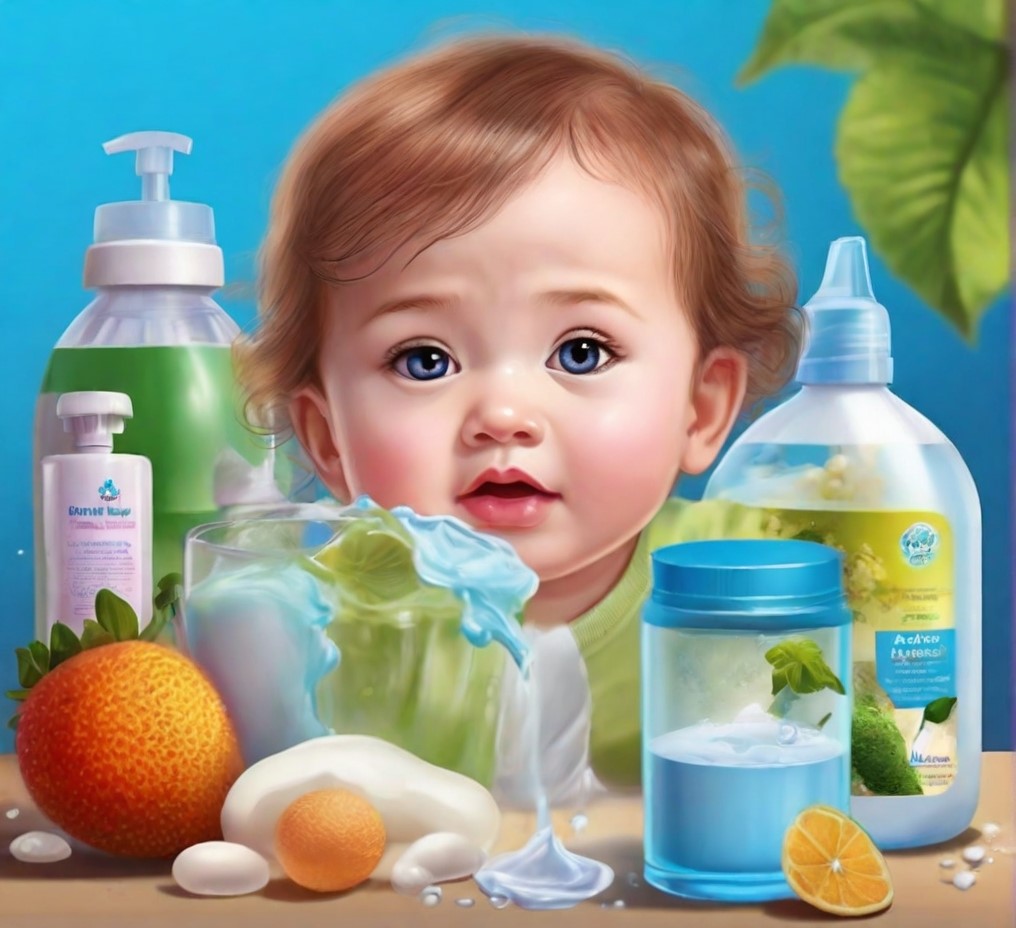
Though Infant skin blemishes. Often resolves naturally. You can help it clear up faster and prevent scarring with a few at-home remedies:
- Cleanse – Gently wash your baby’s face once daily with lukewarm water and a mild, fragrance-free soap. Avoid scrubbing.
- Moisture – After cleansing, apply a gentle moisturizer made for the baby’s sensitive skin. Look for soothing ingredients like oatmeal or aloe.
- Breastmilk – Rubbing a handful of your breastmilk on the affected areas can help clear up acne thanks to the antibodies it contains.
- Avoid irritants – Steer clear of skin products with dyes, perfumes, or chemicals that could further inflame the skin.
- Don’t pick – Never squeeze or pop a baby’s acne, as this can lead to infection and scarring.
With attentive skin care and patience, your little one’s pimply, irritated skin should clear up within a few months as hormones normalize. If symptoms worsen or persist, call your pediatrician.
Tips for Preventing Baby Acne Flare-Ups
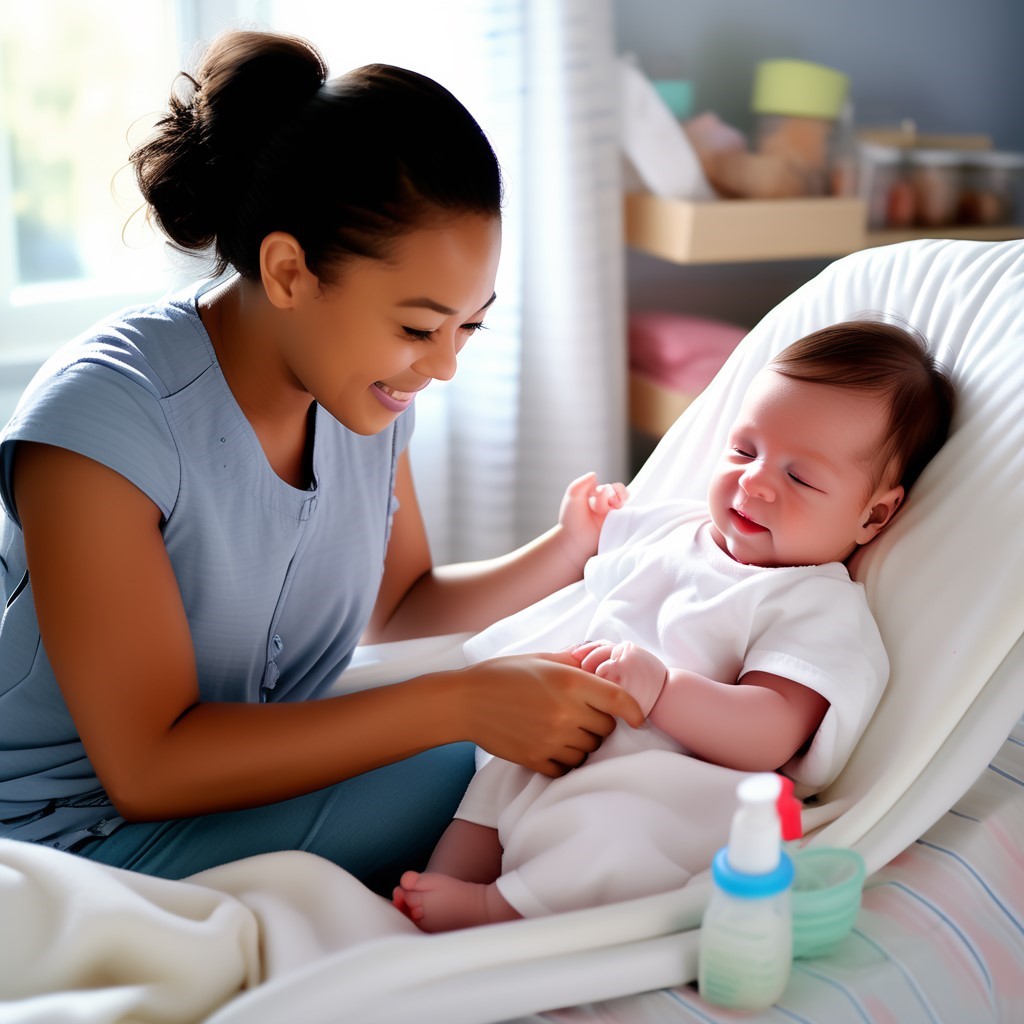
You can’t always prevent infant skin blemishes. Completely, you can reduce flare-ups with a few daily habits:
- Wash pacifiers, bottles, and toys frequently to avoid reinfection.
- Change pillowcases 2-3 times a week.
- Clean your breasts before nursing, and use nursing pads to absorb leakage.
- Keep your newborn’s face clean and dry to discourage bacterial growth.
- Dress the baby in soft, breathable cotton fabrics.
- Avoid overheating your baby to minimize sweating.
- Use fragrance-free baby detergent and avoid fabric softeners.
- Gently clean your baby’s face after feeding.
- Keep your newborn’s nails short to limit skin scratching.
- Limit direct sunlight exposure, which can worsen acne.
You can reduce acne flare-ups and inflammation with diligent hygiene and skin care. But don’t go overboard, as too much washing can dry out your baby’s face.
When to Call the Pediatrician

In most mild cases of baby acne, the rash will clear up on its own within several weeks to months. However, contact your pediatrician promptly if:
- The acne is severe and widespread across the body.
- Pimples ooze pus, bleed, crust, or won’t heal.
- The rash persists beyond 6 months without improving.
- Your baby has a fever, vomiting, or other concerning symptoms along with acne.
- Acne causes significant discomfort or won’t respond to home treatment.
These signs may indicate a more serious skin infection requiring prescription medication. Otherwise, try the natural baby acne treatments above. With a little patience, the pimples should resolve as hormone levels level out.
FAQs About Caring for Baby Acne
Here are answers to some frequently asked questions about managing baby acne:
How long does baby acne last?
Most cases of baby acne resolve on their own within 3-6 months as hormones stabilize. With gentle care, flare-ups can be reduced during this time.
Can baby acne go away and then come back?
Yes, baby acne can sometimes clear up, and then reappear in cycles as hormone levels fluctuate. Follow a consistent daily skincare routine to help prevent recurrent flare-ups.
Should I stop breastfeeding for baby acne?
No, there is no need to halt breastfeeding. Breast milk contains beneficial antibodies! Just keep your breasts and baby’s face clean before nursing sessions.
Does baby acne cause scarring?
No, baby acne rarely scars if left alone. Never pick or squeeze pimples, which can lead to scarring. Seek treatment promptly if you notice any skin darkening.
What’s the difference between baby acne and eczema?
Baby acne consists of small red or white bumps on the face. Eczema appears as a red, flaky rash that can affect the face and body. See your pediatrician if you’re unsure.
Is baby acne contagious?
No, baby acne is not contagious. It results from clogged pores and maternal hormones. But you should avoid touching pimples on another baby’s face, as that can spread acne bacteria.
When to See the Pediatrician
While waiting out your newborn’s baby acne, don’t hesitate to consult your pediatrician if:
- The acne is severe, bloody, or spreading.
- It persists beyond 6 months old.
- Home remedies don’t help.
- Your baby has other symptoms like fever or lethargy.
With the doctor’s guidance, you can find the right treatment approach to clear up stubborn baby acne safely. Otherwise, have patience knowing this pesky but harmless rash will pass. Your little one’s beautiful, healthy skin will shine through with gentle care.

Adel Galal is a health and wellness writer with over 30 years of experience studying and writing about health, fitness, nutrition, and healthy living. He is the founder of NextFitLife.com, where he shares practical, evidence-based guidance to support long-term health at any age. Adel’s mission is simple:
to help people make smarter health choices that fit real life, at any age.

